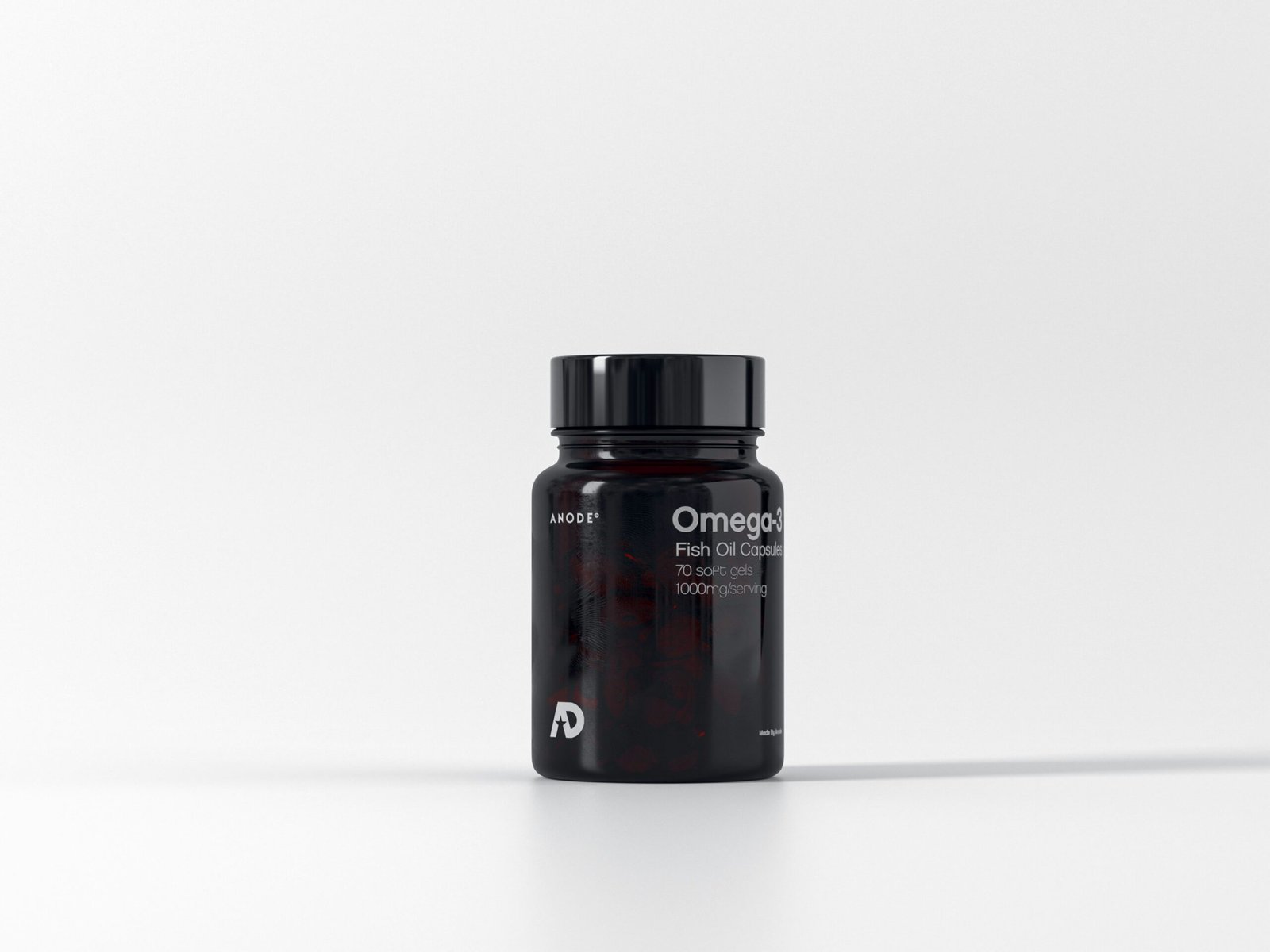
Introduction to Omega-3 Fatty Acids
Omega-3 fatty acids are a crucial component of human nutrition, representing a group of polyunsaturated fats that play a significant role in various bodily functions. There are three primary types of omega-3 fatty acids: eicosapentaenoic acid (EPA), docosahexaenoic acid (DHA), and alpha-linolenic acid (ALA). Each type presents unique benefits and sources, contributing to the overall importance of omega-3s in our diet.
EPA and DHA are typically found in marine sources, such as fatty fish like salmon, mackerel, and sardines. These fatty acids are known for their anti-inflammatory properties and their ability to support cardiovascular health. They play an essential role in brain function and development, making them particularly important during pregnancy and early childhood. On the other hand, ALA is a plant-based omega-3 fatty acid found in foods such as flaxseeds, chia seeds, and walnuts. Although the body can convert ALA into EPA and DHA, this process is inefficient, highlighting the need for direct sources of these crucial fatty acids.
Despite the known benefits of omega-3 fatty acids, many individuals do not consume sufficient amounts through their diet alone. Factors contributing to this shortfall include dietary preferences, such as vegetarianism or veganism, and reduced fish consumption in various populations. As a result, omega-3 supplementation has become increasingly popular as a means to bridge this gap, ensuring that individuals receive adequate intake of these essential fats.
In conclusion, understanding the structure and types of omega-3 fatty acids is vital for appreciating their importance in maintaining optimal health. The essential nature of EPA, DHA, and ALA emphasizes the need for individuals to consider supplementation, particularly when their dietary intake of fatty fish is limited.
Benefit 1: Heart Health
Omega-3 fatty acids, found abundantly in fish oil and certain plant oils, are critical nutrients that contribute significantly to heart health. Numerous studies have consistently shown that the regular intake of omega-3 capsules can lead to reduced inflammation, a major contributor to cardiovascular diseases. Inflammation in the body often causes damage to blood vessels and atherosclerosis, conditions closely linked with heart attacks and strokes. By incorporating omega-3 supplements, individuals may help minimize this inflammatory response, ultimately supporting overall cardiovascular well-being.
Additionally, omega-3s have been shown to have a favorable effect on blood pressure. Research indicates that individuals who consume omega-3 fatty acids experience lower blood pressure levels compared to those who do not. This is particularly important, as high blood pressure is a well-known risk factor for heart disease. Furthermore, omega-3 capsules have been associated with a decrease in triglyceride levels. Elevated triglycerides can contribute to the buildup of fatty plaques in the arteries, which can lead to severe cardiovascular issues. By decreasing these triglyceride levels, omega-3 supplementation plays a vital role in preventing heart-related complications.
According to a meta-analysis published in a leading cardiovascular journal, the consumption of omega-3 fatty acids was linked to a significant reduction in the risk of heart attack and sudden cardiac death. This research underscores the importance of these essential fatty acids in heart disease prevention and overall heart function improvement. Incorporating omega-3 capsules into one’s daily regimen can serve as an effective preventive measure, promoting a healthier heart and significantly contributing to long-term cardiovascular health.
Benefit 2: Brain Function and Mental Health
Omega-3 fatty acids play a crucial role in maintaining optimal brain function and enhancing mental health. These essential nutrients, primarily found in fish oil, are fundamental for the formation of neuronal membranes and are vital for proper cognitive performance. Research indicates that omega-3s are integral to promoting neurogenesis—the process through which new neurons are formed—which is essential for maintaining mental agility as we age.
One of the key benefits associated with omega-3 fatty acids is their positive impact on memory. Numerous studies have demonstrated that sufficient levels of these fatty acids are linked to improved cognitive function and better memory recall. Individuals who consume adequate amounts of omega-3s tend to exhibit enhanced learning capabilities and a lower risk of cognitive decline, making them especially important for both children and older adults.
Moreover, omega-3 fatty acids significantly contribute to mood stabilization. Recent research suggests that these nutrients can help alleviate symptoms associated with mood disorders, including depression and anxiety. They are believed to influence the production of brain-derived neurotrophic factor (BDNF), a protein that supports the survival of existing neurons and promotes the growth of new ones, ultimately playing a role in mood regulation. Furthermore, individuals with lower omega-3 levels have been found to be at an increased risk for developing depressive symptoms, reinforcing the notion that dietary intake can modulate mental health outcomes.
Incorporating omega-3 capsules into one’s daily routine can foster an environment conducive to maintaining cognitive health and managing mood levels. Given their multifaceted advantages, these fatty acids represent a practical and beneficial addition to dietary habits focused on bolstering brain function and enhancing overall mental well-being.
Benefit 3: Joint Health and Inflammation Reduction
Omega-3 fatty acids, particularly those found in fish oil capsules, have garnered considerable attention for their anti-inflammatory properties. These essential fats play a critical role in managing joint health, especially for individuals suffering from conditions such as arthritis. Clinical studies indicate that regular intake of omega-3 capsules can significantly reduce joint pain and stiffness, which are common symptoms among arthritis patients.
The mechanism behind this benefit lies in the ability of omega-3 fatty acids to modulate the inflammatory response in the body. When ingested, omega-3s can decrease the production of pro-inflammatory molecules, leading to a reduction in inflammation. This is particularly significant for individuals with chronic inflammatory conditions, where excess inflammation can exacerbate pain and impair mobility. According to recent research, patients who supplemented with omega-3 capsules reported a decrease in both pain levels and the duration of morning stiffness associated with arthritis.
Moreover, omega-3s are not only effective in lessening the symptoms of existing joint issues but can also provide protective benefits for joint health over time. Regular consumption may slow the progression of osteoarthritis and rheumatoid arthritis, thus maintaining overall joint function and mobility. Personal testimonials further support these claims, with many users noting an improvement in their ability to perform daily activities free from discomfort.
Healthcare professionals often recommend incorporating omega-3 supplements into dietary regimens for those at risk of joint-related issues. However, it is crucial to consult with a healthcare provider to determine the appropriate dosage and ensure compatibility with individual health needs. By proactively integrating omega-3 capsules into one’s routine, individuals may benefit from enhanced joint health and a reduction in inflammation over the long term.
Benefit 4: Eye Health
Omega-3 fatty acids, particularly docosahexaenoic acid (DHA), play a pivotal role in maintaining eye health. DHA is a primary structural component of the retina, where it contributes to the integrity and function of photoreceptor cells. These cells are responsible for converting light into visual signals. Studies indicate that adequate levels of DHA are crucial for optimal visual function and may aid in preventing various eye disorders. This is particularly relevant as individuals age, as the risk of developing age-related macular degeneration (AMD) increases.
Research has shown that a higher intake of omega-3s is associated with a significantly reduced risk of AMD, a condition that leads to vision loss in older adults. For instance, a study published in the “Archives of Ophthalmology” found that individuals who consumed fatty fish or took omega-3 supplements exhibited a lower incidence of AMD compared to those with minimal omega-3 intake. This correlation suggests that omega-3s not only support retinal health but also protect against the degenerative changes associated with aging.
Furthermore, omega-3 fatty acids may also provide symptomatic relief for dry eye syndrome, a common complaint especially among those who spend prolonged hours in front of digital screens. The anti-inflammatory properties of omega-3s can help reduce eye irritation and improve lubrication on the ocular surface. Experts recommend incorporating omega-3-rich foods, such as fish and flaxseeds, or considering high-quality supplements to ensure adequate DHA levels.
In summary, the consumption of omega-3 capsules can significantly benefit eye health, supporting the prevention of AMD and alleviating symptoms of dry eye syndrome. The integration of these essential fatty acids into one’s diet is a scientifically backed method for maintaining optimal vision well into older age.
Benefit 5: Improved Skin Health
The role of omega-3 fatty acids in promoting skin health has garnered significant attention in recent years. These essential fats contribute to the skin’s hydration by assisting in the formation of its protective barrier, which helps keep moisture locked in. This can lead to improved skin texture and a radiant appearance, as well-moisturized skin is less prone to issues such as dryness and flakiness.
Furthermore, omega-3 fatty acids have been shown to enhance skin elasticity. Enhanced elasticity not only provides a youthful look but also helps to prevent sagging and the formation of fine lines. Together with hydration, omega-3s play a crucial part in maintaining overall skin vitality.
Beyond their moisturizing benefits, omega-3 fatty acids also demonstrate anti-inflammatory properties. This characteristic is particularly beneficial for individuals suffering from inflammatory skin conditions like eczema and acne. Studies indicate that higher intake of omega-3s could contribute to a decrease in inflammatory skin responses, potentially leading to fewer breakouts and less severe eczema flare-ups. Dermatological research supports these findings, highlighting the positive effects of omega-3 supplementation on skin conditions characterized by inflammation.
Anecdotal evidence from individuals who incorporate omega-3 capsules into their daily routines often aligns with scientific studies. Many report visible improvements in their skin’s appearance, including reduced redness and acne, enhanced hydration, and overall healthier skin. While individual results may vary, the collective observations underscore the potential benefits of integrating omega-3s into one’s diet, particularly for skin health.
In conclusion, omega-3 capsules can significantly improve skin health through enhanced hydration, increased elasticity, and a reduction in inflammatory skin conditions. Their multifaceted benefits make them a worthwhile addition to any skincare regimen focused on achieving and maintaining healthy skin.
How to Choose the Right Omega-3 Supplement
When selecting an omega-3 supplement, it is crucial to consider several factors that will ensure you are choosing a high-quality product. The first aspect to evaluate is the type of omega-3 present in the capsules. The two most common types found in supplements are EPA (eicosapentaenoic acid) and DHA (docosahexaenoic acid), both of which offer unique health benefits. Depending on your health goals, you may want a supplement that emphasizes one over the other. For example, EPA is often associated with heart health, while DHA is known for supporting brain function.
Sourcing is another important consideration. Opt for omega-3 capsules that are derived from wild-caught fish, as they typically contain higher concentrations of omega-3s and are less likely to be contaminated with harmful substances. In contrast, farmed fish may have lower omega-3 levels and higher levels of pollutants. Check the label for sourcing information to ensure that you are purchasing a supplement that prioritizes quality and sustainability.
Testing for purity is equally essential. High-quality omega-3 supplements should be tested for heavy metals, such as mercury, as well as other contaminants. Look for products that have third-party testing certifications, which provide assurance that they meet safety standards. Additionally, consider the dosage recommendations provided on the packaging. The general guideline for omega-3 intake varies depending on individual health needs, but consulting with a healthcare provider can help tailor the dosage to your requirements.
Lastly, to maximize absorption, it is recommended to take omega-3 capsules with meals, particularly those that contain fat. This enhances the body’s ability to absorb the fatty acids effectively. By considering these factors—type, sourcing, purity, dosage, and timing—you can choose the right omega-3 supplement to support your health effectively.
Possible Side Effects and Considerations
While omega-3 capsules are widely recognized for their numerous health benefits, it is essential to be aware of potential side effects and considerations associated with their use. Some individuals may experience mild reactions, such as gastrointestinal discomfort, including bloating, diarrhea, or nausea. These side effects can occur particularly when taking high doses or when the supplement is not consumed with food. To mitigate these effects, it is advisable to adhere to the recommended dosage and consult with a healthcare professional if any discomfort persists.
Another significant consideration involves the possible interactions of omega-3 capsules with certain medications. Omega-3 fatty acids, especially EPA and DHA, may have blood-thinning effects, which can be particularly relevant for people on anticoagulant or antiplatelet medications, such as warfarin or aspirin. This interaction may increase the risk of bleeding, making it crucial for individuals taking such medications to inform their healthcare provider before starting omega-3 supplementation. Additionally, individuals undergoing surgery should consult their healthcare provider regarding the use of omega-3 supplements to ensure safety during the perioperative period.
Moreover, sourcing omega-3 capsules from reputable manufacturers is vital to ensure quality and purity. Contaminants such as heavy metals, PCBs, and other toxins can be present in poorly manufactured supplements. Therefore, individuals should look for products that have undergone third-party testing for purity. Pregnant or breastfeeding women should also seek advice from their healthcare provider before starting omega-3 supplementation, as the safety and appropriate dosage for these populations can differ from the general recommendations.
In conclusion, while omega-3 capsules offer numerous advantages, potential side effects and interactions necessitate caution. Always consult with a healthcare provider before beginning any supplementation regimen to ensure both safety and effectiveness.
Conclusion: Embracing the Benefits of Omega-3
In the quest for improved health and well-being, incorporating omega-3 capsules into one’s daily routine emerges as a compelling recommendation. The benefits presented throughout this discussion highlight the significant role these essential fatty acids play in maintaining optimal body function and mental clarity. By enhancing cardiovascular health, supporting cognitive function, reducing inflammation, and promoting skin health, omega-3s showcase their multifaceted advantages.
Moreover, a balanced diet rich in omega-3 sources, such as fatty fish, flaxseeds, and walnuts, should complement the use of omega-3 supplements. This synergy enables individuals to achieve a holistic approach to wellness, ensuring that they receive a broad spectrum of nutrients essential for overall health. Additionally, incorporating a variety of food sources assists in maximizing the benefits of omega-3 fatty acids while catering to a diverse palette.
Although omega-3 capsules provide an effective means to enhance daily intake, it is vital to integrate them into a lifestyle that includes regular physical activity, sufficient hydration, and stress management techniques. These practices, when combined with proper supplementation, can lead to more comprehensive health improvements and a better quality of life.
As scientific research continues to reinforce the necessity of omega-3 fatty acids for physical and mental health, individuals are encouraged to explore the various options available in the market. Consulting with healthcare professionals can further aid in determining the appropriate dosage and form of omega-3 supplements to suit individual needs. Ultimately, embracing omega-3 capsules as part of an overall wellness strategy reflects a proactive approach toward achieving and sustaining optimal health outcomes.
Call to Action
As we conclude our exploration of the numerous benefits of taking omega-3 capsules, we encourage you to reflect on your own experiences with these supplements. Have they positively impacted your overall health and well-being? Sharing your journey not only enriches our community but also allows others to benefit from your insights.
We invite you to leave a comment below, detailing your experiences with omega-3 supplements. Are there specific benefits you’ve noticed, or challenges you’ve encountered while incorporating them into your routine? Your feedback can provide valuable information for fellow readers who may be considering adding omega-3 to their health regimen.
Moreover, feel free to pose any questions related to omega-3 supplements or nutrition in general. Engaging discussions can lead to better understanding, and our community is here to support each other in our health journeys. Whether you are curious about dosage, specific brands, or the best sources of omega-3, do not hesitate to ask.
In addition to our discussion, we also encourage you to explore more resources related to health and nutrition available on our blog. Our content is designed to provide insights into various aspects of well-being, empowering you to make informed decisions about your health. For personalized advice, consult with a health professional who can guide you based on your individual needs.
Omega-3 capsules can play a vital role in enhancing your health, granting numerous benefits that align with a balanced lifestyle. By sharing this article with friends and family, you can help spread awareness about the advantages of omega-3 supplements, inspiring others to take control of their health. Thank you for being part of this conversation, and we look forward to hearing from you!
RELATED POSTS
View all


